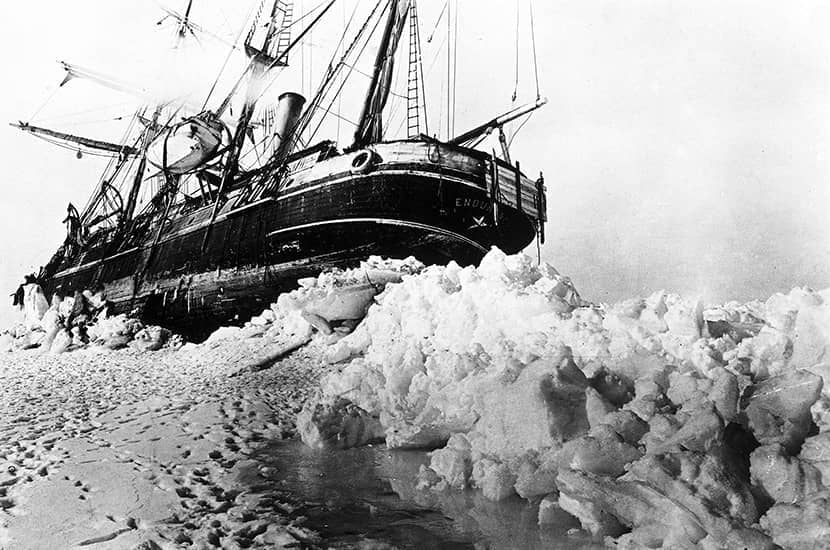In Competition No. 3243, you were invited to submit a poem about the recent discovery of Sir Ernest Shackleton’s Endurance.
This comp, suggested by a kind reader who thought a chink of good cheer amid the general bleakness worth celebrating, elicited a smallish entry in which echoes ranged from Keats to Benny Hill. An honourable mention to David Silverman’s haiku:
Fuss over a boat Goes to show the importance Of being Ernest
The winners, printed below, net their authors £25 each.
Chill polar sirens wooed Ernest H. Shackleton, Singing him southward with Wintry allure. Ice trapped and sank him, then Hypergelidity Deep undersea helped his Ship to endure. Weddell Sea life forms are Contra-xylophagous. Vessels of wood are a Snack they abjure. Far from a warmer sea’s Biodiversity, Shackleton sank where his Ship could endure. Chris O’Carroll
Two thousand fathoms deep Endurance lies at rest upon the Weddell Sea’s soft bed, and, though abandoned, finds a different guise, suff’ring a sea-change once her crew had fled. The hull survives, and nothing of her fades – with creatures of the depths she lives again, a crew of sea-stars, sponges, now invades the empty space once occupied by men. Anemones upon the starboard bow, another takes its place behind the wheel, a ghostly-white ‘squat’ lobster claims the prow and colonies of sea-squirts clutch the keel. Now, undisturbed, the ship rests in the deep While, rich and strange, these creatures guard her sleep. Sylvia Fairley
That ship was filmed in nineteen-fifteen, when It sank below the ice. And then again Cameras were on hand when it was found. The ship’s crew had escaped. No one was drowned When it went down beneath the Weddell Sea, To lie there for more than a century, But other young men died that very day In Flanders, more than half a world away. The crew, the soldiers, all of them are gone. We check the dates, remember Shackleton From the Boys’ Book of Heroes long ago, And seek on maps places we do not know. Near the ship swims a creature. We are told It’s a squat lobster. Squatting in the cold Right by the ship’s name makes a metaphor For men’s endurance both in peace and war. Brian Murdoch
Under a lullaby of ice, By the currents shifted, shuttled – A strange idea of paradise, Unscuttled: Where the blizzard does not reach, Timbers shivered, hardly weathered – Still and silent, but a speech Untethered. None are left who rigged its sails, Or who watched it drown, half-blinking: None thought to find its stern, its rails Unsinking. Urchins, squirts and brittlestars Hold court there, unabated: They too endure, their repertoires Undated. Bill Greenwell
Ernie was only forty-seven, he didn’t want to die but he’s plodding after Nansen where the Empire meets the sky. His countrymen ignored him in their craze for Captain Scott, and James Caird to South Georgia was a tale that time forgot. But a nation’s taste in heroes is fickle as the sea, so they sent a yellow robot to pinpoint his crushed debris. Is that two sperm whales mating in Antarctic paradise, or Ernie’s ship Endurance asleep below the ice? She won’t forget old Ernie! (Ernie!) And he drove the toughest steam-yacht in the south. Nick MacKinnon
So all day long the noise of searching filled The icy mountains of the winter sea Until Sir Ernest’s ship at last was seen And on her stern ENDURANCE proudly gleamed. When naval crew and archaeologists Observed the wreck that for a hundred years Slept peacefully beneath the Weddell Sea Their eyes were dazzled as they saw the ship Intact, undaunted as the day she sank. And when they glimpsed the shining five-point star, Polaris, the great vessel’s primal name, Their hearts enjoyed the happiness of pride. Though years had darkened round him now it seemed That Shackleton had shuffled out of death To greet the gallants who had found his ship. Frank McDonald
No. 3246: let’s get physical
Nicola Shulman wrote a piece in this magazine about Philip Larkin’s penis. You are invited to submit a poem in the style of the poet of your choice (please specify) about a problematic appendage. Please email entries of up to 16 lines to lucy@spectator.co.uk by midday on 20 April.






Comments